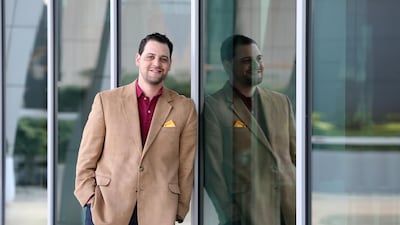What does heritage mean in a rapidly changing world? Last week, as part of the National Day celebrations, artists who live in the UAE took to the stage at New York University Abu Dhabi to express, in poetry and song, what it means to them, under the theme “Hekaya” (The Story).
Event curator Dorian Rogers, who also hosts the regular Rooftop Rhythms open-mic poetry nights in Abu Dhabi, says his heritage provides inspiration for his poetic musings.
His African-American father also has white American and Seminole Indian ancestry, while his mother is Polish-American.
“Every part of my mix is something related to suffering, whether it be the holocaust, the African-American enslavement, or the mistreatment of the indigenous Seminole Indians in America,” he says.
“I have this inner genetic yearning to delve into my pain and find out where that comes from. A lot of the time, my poetry arises from this yearning to speak out for the unspoken.”
Rogers is still on his voyage of discovery when it comes to his heritage. Shortly after moving to Abu Dhabi five years ago, he visited the site of the German concentration camp Buchenwald.
“This was very emotional for me,” he says. “Life is a continuing journey to find out what my ancestors have been through, and how their stories make me what I am.”
Emirati Noura Al Khoori, who writes children’s stories that reflect local culture, says her sense of heritage is bound to the UAE’s rapid development – aspects of which are showcased at this year’s Sheikh Zayed Heritage Festival at Al Wathba, which runs until January 2.
“The Emirates grew exponentially from a small, unheard-of oasis in the desert to one of the world’s most coveted metropolitan [locations] in less than five decades,” she says. “That stunning speed made native Emiratis cling to their roots even harder and more steadfastly.
“Emiratis are diluted in number in their own country, due to the large influx of expats who find this country appealing to live in. Being a minority group, we are attached umbilically to our original pristine culture in all its facets and forms.
“Our Arabian-Emirati heritage is the air we breathe, the blood that makes up our cells, embedded in our genes and undoubtedly passed on to our progeny.”
Audience member Cathryn Downing, from South Africa, says heritage means cooking a traditional meal that her grandmother taught her to make.
“As soon as I taste it, I can imagine her standing in the kitchen all excited because she’s cooking something for her family that we all love,” she says.
As a keen choralist, the 38-year-old also finds that heritage lives in music.
"When any South African living in the Emirates hears the South African song Shosholoza, or I Miss the Rains in Africa, those songs take us home."
Downing believes expats in the UAE are actually more demonstrative of their heritage than people in their home countries.
“Last weekend, South Africa won the Rugby Sevens.” she says. “I didn’t watch it, but I made it a point to shout ‘We won the Sevens’ when I got into work. It’s because you miss home so much that when your country wins at something, you feel so proud.”
But for fellow South African, and event organiser, Clive Primrose, his sense of heritage is tinged with the legacy of apartheid.
“I was the privileged race until I was 12 [in 1992], when apartheid fell,” he says. “Being so young, I had no idea what apartheid was. Life was just like that. Once apartheid fell, the country changed quickly. Now, South Africa has become the flip of what it was in the 1980s. Being white, I have no home there because the government does not want me there. “For me, heritage is the values and morals I choose to live by and those that I bring my children up with. I have no country to call home – but I do have a family that are my home.”
For poet Dina Hardy, who teaches creative writing in Dubai, heritage is handed down genetically, as well as being where you feel most at home.
“Some people try to escape that, and with the expat life, there’s this feeling of roaming and trying on other cultures,” she says.
Hardy is from California, but the ancestry on her mother’s side is Danish, while her father’s is English and German.
“Thinking about heritage for this show, I thought about my Danish grandfather a lot – I have his very Danish chiselled chin,” she says. “When my husband and I went on holiday to Copenhagen, I looked like everyone else and people came up and started speaking Danish to me.
“I thought: ‘This is what it feels like to be home’.”
• For details of the Sheikh Zayed Heritage Festival, visit www.zayedfestival.com
artslife@thenational.ae

